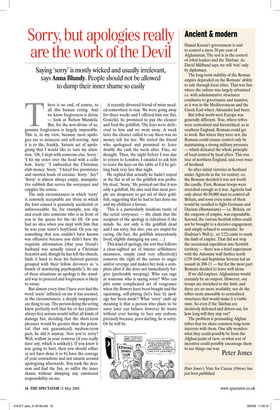Sorry, but apologies really are the work of the Devil
Saying ‘sorry’ is mostly wicked and usually irrelevant, says Anna Blundy. People should not be allowed to dump their inner shame so easily There is no end, of course, to all this human erring. And we know forgiveness is divine — look at Nelson Mandela. But, for the non-divine of us, genuine forgiveness is largely impossible. This is, in my view, because most apologies are so insincere and self-serving. And it is to the, frankly, Satanic act of apologising that I would like to turn my attention. ‘Oh, I slept with someone else. Sorry.’ ‘I hit my sister over the head with a cello bow. Sorry.’ ‘I embezzled the Christmas club money. Sorry.’ ‘I hired five prostitutes and snorted loads of cocaine. Sorry.’ See? ‘Sorry’ is almost always empty, manipulative rubbish that serves the sorrysayer and cripples the sorree.
The only circumstances in which ‘sorry’ is remotely acceptable are those in which the hurt caused is genuinely accidental or unforeseeable. So, for example, you slip and crash into someone who is in front of you in the queue for the ski lift. Or you had no idea when you slept with him that he was your sister’s boyfriend. Or you say something that you couldn’t have known was offensive because you didn’t have the requisite information (that your friend’s husband was actually raised a Christian Scientist and, though he has left the church, finds it hard to hear his beloved parents grouped with their fellow devotees as ‘a bunch of murdering psychopaths’). In any of these situations an apology is the standard way to proceed and forgiveness is likely to ensue.
But almost every time I have ever had the word ‘sorry’ inflicted on me it has seemed, in the circumstances, a deeply inappropriate thing to say. The person doing the erring knew perfectly well that his or her (almost always his) actions would inflict all kinds of damage but, deciding that the short-term pleasure would be greater than the potential (but not guaranteed) medium-term pain, he did it anyway. Now you’re sorry? Well, wallow in your remorse (if you really have any, which is unlikely). If you knew it was going to hurt, then you should either a) not have done it or b) have the courage of your convictions and not smarm around apologising afterwards. You took the decision and had the fun, so suffer the inner shame without dumping any emotional responsibility on me. A recently divorced friend of mine needed somewhere to stay. We were going away for three weeks and I offered him our flat. Grateful, he promised to pay the cleaner and feed the goldfish. The keys were delivered to him and we went away. A week later the cleaner called to say there was no money left for her. We texted the friend who apologised and promised to leave double the cash the week after. Fine, we thought. Then, the night before I was due to return to London, I emailed to ask him to leave the keys on the table as I’d be getting back very late that night.
He replied that actually he hadn’t stayed at the flat at all so the goldfish was probably dead. ‘Sorry.’ He pointed out that it was only a goldfish. He also said that most people are desperate to get rid of their goldfish, suggesting that he had in fact done me and my children a favour.
This is a particularly insidious tactic of the serial sorrysayer — the claim that the recipient of the apology is ridiculous if she minds. So, not only is the goldfish dead and I am sorry, but also, you are stupid for caring. (In fact, the goldfish miraculously lived, slightly damaging my case... ) This kind of apology, the sort that follows a clear-sighted act of intense selfishness/ meanness, simply (and very effectively) removes the right of the sorree to anger and/or revenge and makes her look a complete idiot if she does not immediately forgive (preferably weeping). Who can rage at someone who is saying sorry? Who can plot some complicated act of vengeance when the flowers have been bought and the squirming, self-pitying (let’s face it) apology has been made? What ‘sorry’ ends up meaning is that a person who plans to be sorry later can behave however he wants without ever having to face any redress, precisely because, poor darling, he is sorry. Or he will be. ‘Sorry’ is like honesty. When someone says; ‘To be honest... ’ they are either about to lie or they are about to tell you that they’ve slept with someone else. My advice in either of these situations would be — keep it to yourself and don’t try to scuttle, cockroach-like, out of it by begging for guilt-purging forgiveness.
Another typical sorrysayer’s tactic, usually cleverly combined with the you’re-stupid-for-minding ploy, is to apologise and then to follow the apology with a watertight reason for having performed the hurtful action in the first place, again rendering the sinned-against ridiculous. When the children were little my husband used very often to go out drinking all night. ‘Sorry,’ he would say. ‘But you were in anyway and wanted an early night and Karim made me come to the pub and I hadn’t seen him for ages and... ’ This is the ‘sorry, but... ’ followed by justification ploy. And all the complicated pub-based justification being true, there was no way I could rationally argue that I was upset. For it is, especially with a man, a rational argument that is required — no amount of ‘it upset me’ will do. (And the justification, reworded, is always translatable as, ‘Sorry, but I wanted to and I don’t care about you very much.’) Isn’t the self-justification — the claim that it wasn’t that bad, that I’m stupid or petty for minding — something verging on psychological abuse? Isn’t it the kind of thing that sends people mad? Very Gaslight. So, I feel wronged and angry and miserable, but if the wrongdoing is trivialised and an apology has been made, then I must, surely, be insane to continue to harbour hurt?
The Catholic Church has perhaps, this once, got it about right. Only if you are genuinely remorseful, and resolved never to do this awful confessed thing again, can you be forgiven. In addition, it is essential to make amends in some concrete fashion (A bit like step nine of AA — step nine of 12! Imagine how contrite you’d be by step nine!). Of course, a sincere apology, genuine remorse, a reparation and a promise, might move the misdeed out of the arena of horrific attack and into the arena of ‘something to be discussed and dealt with’. This, in the Catholic sense, would certainly be a positive move. And, again, the sorrysayer would be unlikely to offer a really sincere apology for poking her brother in the eye with a pen, when clearly this was something she’d been plotting for weeks and will certainly do again at the earliest opportunity. It’s not as though she slipped on a banana skin and fell with her finger pointing towards his face.
It is no secret that a lot of people who feel fundamentally guilty about all sorts of complicated childhood murkiness do terrible things in order to have a good excuse to apologise and then, hopefully, to be forgiven and feel purged, restored — better. Not that it ever works, because the apology cannot, by its nature, be relevant to the real issue.
A real, proper, Catholic sorry is very different from an unburdening yourself and burdening the sorree sorry. A real sorry will be dirty, messy, sad and perhaps, eventually, moving. A rubbish apology can only result in rubbish forgiveness. A rubbish sorry is just part of a psychological power game — strip the sorree of the right to anger and revenge and dominate the moral high ground with one tiny word.
So, if my goldfish-murdering-non-houseguest (all right, so it was attempted murder) or my trapped-in-the-pub husband reads this and minds, well....











































































 Previous page
Previous page